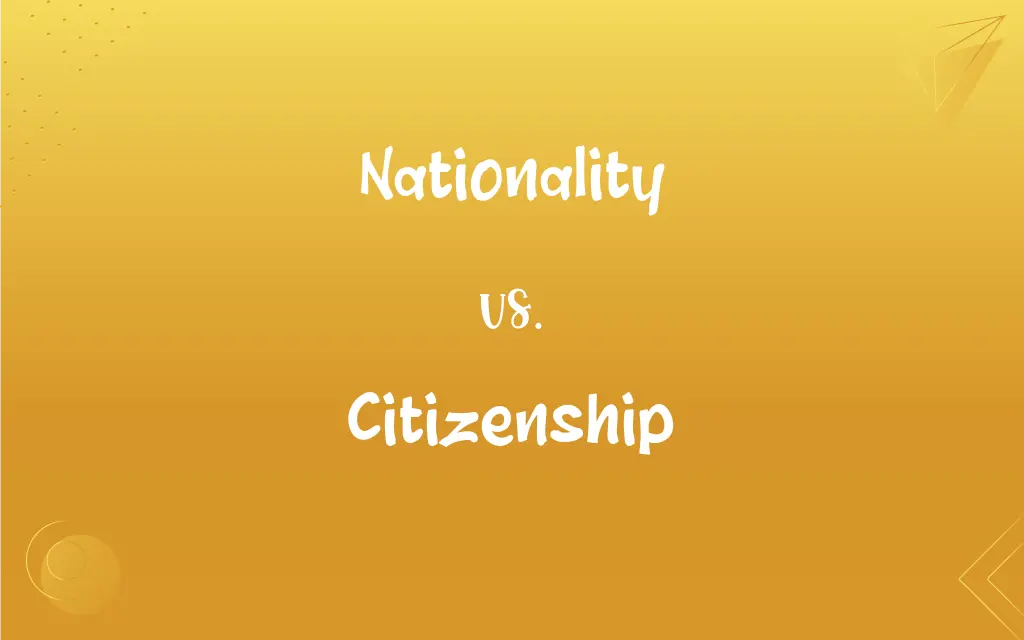Nationality vs. Citizenship: What's the Difference?
Edited by Aimie Carlson || By Harlon Moss || Updated on October 17, 2023
Nationality refers to one's belonging to a particular nation by origin, heritage, or culture, while citizenship is the legal membership in a specific country.

Key Differences
Nationality is often a term used to describe the relationship between an individual and their nation of origin or heritage, often based on cultural, historical, ethnic, or genetic ties. It's a shared identity that might include elements such as language, culture, ancestry, or history. Citizenship, on the other hand, is a legal status conferred by a state to an individual, often tied to legal rights, duties, and privileges, such as the right to vote, work, and reside in a country. While nationality can invoke a sense of community and belonging beyond legal boundaries, citizenship is a recognition of one's legal rights and responsibilities within a specific political and geographic boundary.
Nationality can be considered immutable, something that individuals are born into, or acquire involuntarily, based on their parents' nationality or ethnicity. This concept transcends the legal framework, often creating a sense of identity among people globally irrespective of their current country of residence. Conversely, citizenship is a mutable legal status, which can be changed or chosen by legal mechanisms such as naturalization or renunciation. Someone can choose to become a citizen of a country different from their nationality, embracing new legal rights and responsibilities, while still retaining their original cultural and ethnic identity.
Nationality, in its broader sense, is not always synonymous with citizenship because it encompasses cultural, historical, and emotional aspects that do not require legal recognition. People often feel a deep connection with their nationality, as it reflects their heritage, traditions, and ancestral roots. Citizenship, however, is a legal concept that denotes a person's membership in a sovereign state. Citizens are part of a political entity, with certain rights, such as political participation, and duties, like taxation or jury service, that are not necessarily shared by all who share a nationality.
The concept of nationality plays a crucial role in international law; for instance, countries might claim jurisdiction over individuals based on their nationality, or individuals might claim protection from a foreign state based on it. Nationality offers a sense of cultural identity and belonging to a larger global community. Citizenship, by contrast, is fundamental in domestic law, determining individuals' eligibility for specific rights and privileges provided by the state, such as social benefits, property ownership, or diplomatic protection. While nationality might be recognized universally, citizenship rights and responsibilities are typically confined within the state that grants them.
Nationality can sometimes result in dual or multiple affiliations, as individuals can identify with more than one nation due to mixed heritage, ethnicity, or other cultural ties. This plurality does not always translate into legal status, as not all countries recognize or permit dual or multiple citizenships. Citizenship, in this legal context, requires formal acknowledgment and can sometimes necessitate individuals to renounce their original citizenship to adopt a new one, depending on the country's laws. The multiplicity in nationality reflects the complexity of human identity, whereas citizenship represents a legal bond with a state and its judicial system.
ADVERTISEMENT
Comparison Chart
Definition
Relation to a nation through birth, descent, or culture.
Legal membership in a country, granting rights and responsibilities.
Basis
Often based on ethnicity, culture, or birthplace.
Based on legal criteria, which can include birth, descent, or naturalization.
Permanence
Generally remains consistent unless renounced or legally changed.
Can be acquired, renounced, or stripped away based on a country’s laws.
Rights & Duties
Does not guarantee specific rights or duties.
Grants specific rights, duties, and responsibilities within a country.
Scope
Can pertain to multiple nations (e.g., dual nationality).
Typically pertains to one nation, although dual citizenship is possible in some cases.
ADVERTISEMENT
Nationality and Citizenship Definitions
Nationality
The connection of an individual to a nation by birth or descent.
Her nationality is French because she was born in France.
Citizenship
The rights and responsibilities given to members of a state.
With citizenship comes the duty to vote and abide by the country's laws.
Nationality
The legal relationship between an individual and a sovereign state.
The passport verified her nationality as Canadian.
Citizenship
The process of becoming a recognized subject of a nation.
His journey to citizenship took several years and lots of paperwork.
Nationality
A shared cultural or ethnic identity.
Despite living in the US, his nationality ties him to Japanese traditions and customs.
Citizenship
The legal status of being a member of a particular country.
She gained citizenship in the US after passing the naturalization test.
Nationality
An individual's claim to belong to a specific country or state.
Even though he lived abroad, his nationality remained Indian.
Citizenship
Status achieved by birth or naturalization in a country.
Her Canadian citizenship was acquired by birth, while her American citizenship was through naturalization.
Nationality
A distinction based on common race, language, or culture.
The diverse nationalities at the festival showcased global traditions.
Citizenship
The character of an individual viewed as a member of society.
Teaching citizenship in schools emphasizes the importance of community involvement.
Nationality
The status of belonging to a particular nation by origin, birth, or naturalization.
Citizenship
The status of a citizen with its attendant duties, rights, and privileges.
Nationality
A people having common origins or traditions and often constituting a nation.
Citizenship
The status of being a citizen, in its various senses.
Citizenship
The state of being a citizen, in its various senses.
Citizenship
The state of being a citizen; the status of a citizen.
Citizenship
The status of a citizen with rights and duties
Citizenship
Conduct as a citizen;
Award for good citizenship
FAQs
What is dual citizenship?
Dual citizenship is when a person is a legal citizen of two countries simultaneously, with legal rights and obligations associated with both countries.
Is nationality the same as ethnicity?
No, nationality refers to a person's affiliation with a country, often by birth or heritage, while ethnicity refers to cultural factors like language, ancestry, history, and societal shared experiences.
Do nationality and citizenship always coincide?
No, a person's nationality (cultural, ethnic affiliation) and citizenship (legal status) can differ, especially in cases of naturalization or dual citizenship.
Can citizenship be changed?
Yes, individuals can change citizenship through processes like naturalization, marriage, or investment, depending on the laws of the intended country.
Can someone have multiple nationalities?
Yes, individuals can identify with multiple nationalities due to reasons like mixed heritage, though this is a cultural/social concept rather than a legal one.
Do all countries allow dual citizenship?
No, policies on dual citizenship vary widely; some countries permit it, some have restrictions, and others don't recognize it at all.
Is nationality determined by place of birth?
Not always. Nationality can be acquired by birth, but it can also refer to ethnic or cultural affiliations regardless of one's birthplace.
What's the relationship between passport issuance and citizenship?
Passports are typically issued to citizens by their countries, serving as proof of citizenship and identity, and allowing international travel.
Is citizenship always by birth?
No, citizenship by birth (jus soli or jus sanguinis) is common, but individuals can also acquire citizenship through processes like naturalization.
Is nationality mandatory on official documents?
Nationality is often required on official documents like passports or ID cards as it indicates a person's legal bond with a nation, not just their ethnic or cultural identity.
Can marriage affect citizenship?
Yes, in many countries, marriage to a citizen can provide a pathway to citizenship, though it typically involves a complex legal process.
Can citizenship be revoked?
Yes, countries can revoke citizenship based on certain circumstances, such as fraud during the naturalization process or certain criminal activities, depending on national laws.
Does one's nationality affect their legal rights?
Nationality, as a cultural concept, doesn't confer legal rights. However, citizenship, often tied to nationality, does grant specific legal rights and responsibilities.
What role does citizenship play in political participation?
Citizenship usually grants the right to vote, run for office, and participate in political processes within a country, rights not always granted to non-citizens.
Does every country define nationality in the same way?
No, the definition of nationality can vary, influenced by each country's historical, cultural, and legal frameworks.
Are the rights of citizens and non-citizens different?
Generally, yes. Citizens have full legal rights and responsibilities in their country, while non-citizens' rights can be limited (e.g., no right to vote).
How is citizenship proved?
Citizenship is usually proved through official documents like birth certificates, citizenship certificates, or passports, depending on a country’s regulations.
Can a person renounce their citizenship?
Yes, most countries have legal procedures allowing individuals to renounce their citizenship, though the conditions and consequences vary.
What is statelessness?
Statelessness is the condition where an individual does not hold citizenship under the laws of any country, depriving them of basic legal rights and social services.
Can you lose your nationality?
Nationality as cultural identity isn't typically "lost," but legal nationality or citizenship can be renounced or revoked under specific circumstances.
About Author
Written by
Harlon MossHarlon is a seasoned quality moderator and accomplished content writer for Difference Wiki. An alumnus of the prestigious University of California, he earned his degree in Computer Science. Leveraging his academic background, Harlon brings a meticulous and informed perspective to his work, ensuring content accuracy and excellence.
Edited by
Aimie CarlsonAimie Carlson, holding a master's degree in English literature, is a fervent English language enthusiast. She lends her writing talents to Difference Wiki, a prominent website that specializes in comparisons, offering readers insightful analyses that both captivate and inform.
































































